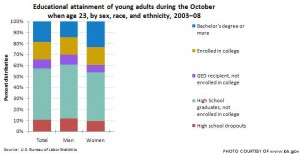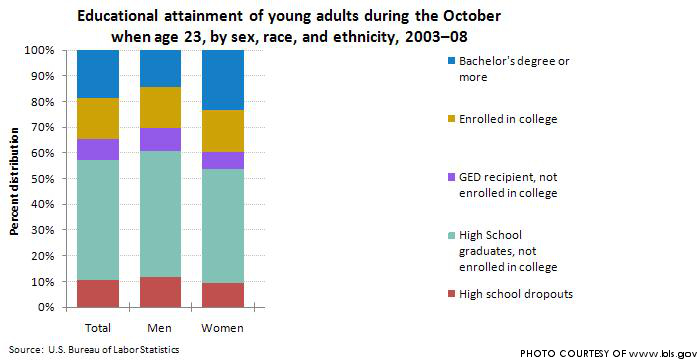
Over the past several years many statistics have been published detailing the number of men and women graduating from college. According to an article on cnsnews.com, “685,000 men and 916,000 women graduated from college in 2009 (the latest year for which statistics have been published).” Therefore, 25% fewer men graduated from college than women in 2009.
In that same year more women earned master’s and doctorate degrees than men. And the trend is only increasing.
The fact that women in general are becoming more educated, receiving higher degrees, and making more money than their male counterparts provides for an interesting question: Are women forced to marry down–marry men with less education and less earning potential than themselves?
An article in post-gazette.com details the relationship trend over the past century. Before the 1950s, most marriages were geared toward smart, wealthy men looking for wives who could run the household and make dinner. Stuck in the cult of domesticity, women were expected to clean the house and take care of family. Men married down and women “married up”, a term called hypergamy. In some instances, women were somewhat forced to marry up in order to guarantee their financial security. But as the 1960s feminist movement spread–due to Gloria Stein’s Ms. magazine and Betty Friedan’s book, The Feminine Mystique–women married men who were had equal financial and academic status as themselves. Marriages were considered homogamous–meaning people married those who were similar to themselves. Yet as women are gradually receiving more education and gaining a higher earning potential (which doesn’t necessarily translate into higher wages), many are having a hard time finding an equal partner.
That being said, many believe that the rise women are experiencing in economic, financial, and academic status is great when it comes to relationships. Stephanie Coontz, writer for the New York Times, argues that marriage fits high achieving and well educated women. She believes that now “we can now expect more of a mate than we could when we depended on men for our financial security, social status and sense of accomplishment.” However, Coontz does admit that the there is a trend of women marrying down: “30 percent of wives today have more education than their husbands, while less than 20 percent of husbands have more education than their wives.”
Even in high school I have noticed the trend of women achieving to a higher extent than men. In my AP English IV class, for example, there are only 4 boys compared to 25 girls. Again in another class, AP European History, there are 14 boys and 16 girls. The margin is closer, but there are still more females than males. Even the two people tied for valedictorian are girls: Jessica Merdes and Lillian Chen. Girls at Leesville are taking harder classes and striving for higher GPA’s–what are the boys doing? If there is such a presence of academically strong girls in AP classes, be it Calculus or English or European History, where are the smart and hardworking boys?
High school boys do have a reputation of being underachievers. Psychological studies show that boys are associated with underachievement because they think that they are supposed to be tough, and quietly sitting in class doing work doesn’t make them appear cool. Males actually have weaker communication, language, and writing skills than females, so perhaps some school assignments just come more naturally to girls.
Dani Youmans, Leesville senior, recognizes the achievement gap between high school guys and girls and the problems it can cause for relationships.
“I want to find a guy who I can carry an intellectual conversation with. But I’ve noticed that there are less and less guys who enjoy being smart and who want to push themselves academically,” said Youmans.
While women may be over achievers, only time will tell if they will be forced to “marry down” to men who don’t achieve to the same level, be it in high school, college, or simply life. If these statistics continue and if women keep earning a higher degree of education than men, businesses will eventually see more women filling the workplace and becoming CEO’s. There could be a reversal of gender roles–men could transition to becoming stay at home dads, while women could become the “breadwinners” of society. About time, right?

Leave a Reply